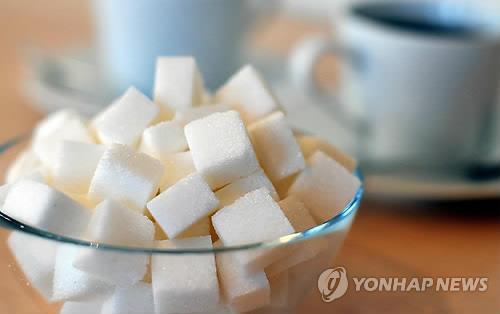The South Korean food industry pledged Friday to actively partake in new government measures aimed at reducing citizens’ sugar consumption and promoting public health.
Local food companies say they are already engaged in efforts to reduce sugar content in their products and will continue on this trajectory in line with rising health consciousness here and abroad.
“The food industry will actively abide by the government’s new policy toward sugar reduction,” the Korea Food Industry Association said in a statement. “As a consumer-based industry, we are dedicated to promoting the health of our citizens.”
 |
(Yonhap) |
The new measures, announced by the Food Ministry on Thursday include requiring all food-makers to openly share their products’ sugar levels, pursuing health awareness campaigns and banning schoolchildren from consuming high-sugar foods such as carbonated drinks and coffee, among others.
The ministry’s net goal is to ensure that every citizen’s sugar consumption only makes up 10 percent of their daily calorie intake -- a move forecast to take a toll on the sales of sugary foods here.
Market officials say the trend against high sugar consumption is not new. Though there will be difficulties, companies plan to ramp up efforts to introduce a wider range of low-sugar food products amid growing health concerns.
Korea’s leading sugar maker CJ CheilJedang said it does not expect drastic changes to the sugar market in the short run, though long-term shifts will be inevitable due to changing consumer preferences.
“As the industry has been aware of sugar issues for a long time, we do not expect the new policy to take a significant toll on the sugar market as of now,” CJ CheilJedang spokesperson Chai Min-su told The Korea Herald.
Nonetheless aware of consumers’ moves to lower sugar intake, CJ plans to continue investing in developing more sugar substitutes like Xylose and Allulose sugar that allow consumers to enjoy new forms of “healthier sweetness.”
“Though it won’t happen immediately, we believe food companies in the B2B market to increase their use of sugar substitutes in the long run as well in line with growing health demands,” Chai said.
The beverage and snacks industry, which stands to be impacted the most by a movement against high-sugar foods, cited plans to offer a wider variety of low-sugar products to consumers in the future.
“We will fully abide by any government policy related to lowering public sugar consumption and work to offer a wider variety of low-sugar products in the future,” Kang Hyun-joong, a spokesperson for Korea’s top beverage maker Lotte Chilsung Beverage, told The Korea Herald.
 |
(Korea Yakult) |
Korea Yakult, the best-known seller of yogurt drinks, said it has already reduced sugar content in all of its fermented dairy products as part of a low-sugar campaign launched in August 2014.
Sales of Yakult Light, which contains about half as much sugar compared to regular Yakult, has risen by 400 percent as of March 2016 since its launch, the firm said.
As a forerunner in this direction, the firm will “further work to lower the amount of sugar in its products as well as implement healthier substitutes for sugar in the future,” according to company spokesperson Park Won-kyung.
Lotte Confectionery, Korea’s top snack producer, told The Korea Herald that it is reviewing plans to develop low-sugar sweets in line with the government’s initiative, though it will require significant time and effort.
“It is not easy to suddenly change a recipe and developing new low-sugar products will take some time,” Lotte Confectionary spokesperson Ahn Sung-kun told The Korea Herald.
“What’s most important making products that can appeal to consumers’ tastes -- a complex process which will require time and effort.”
Other critics echoed similar concerns, pointing out that food firms may be reluctant to make drastic changes in their recipes, in fear of losing customers.
“It is inherently difficult for a food company to reduce sugar content in a product, as lowering it can change its taste. This could lead to customers, who are used to the original taste, turning away from buying the product,” a food industry official said on condition of anonymity.
“Nonetheless, ‘low-sugar’ is an inevitable trend that cannot be avoided. Companies will need to make efforts to reduce sugar content in their products while maintaining taste.”
By Sohn Ji-young (
jys@heraldcorp.com)







![[Herald Interview] 'Trump will use tariffs as first line of defense for American manufacturing'](http://res.heraldm.com/phpwas/restmb_idxmake.php?idx=644&simg=/content/image/2024/11/26/20241126050017_0.jpg)
![[Exclusive] Hyundai Mobis eyes closer ties with BYD](http://res.heraldm.com/phpwas/restmb_idxmake.php?idx=644&simg=/content/image/2024/11/25/20241125050044_0.jpg)
